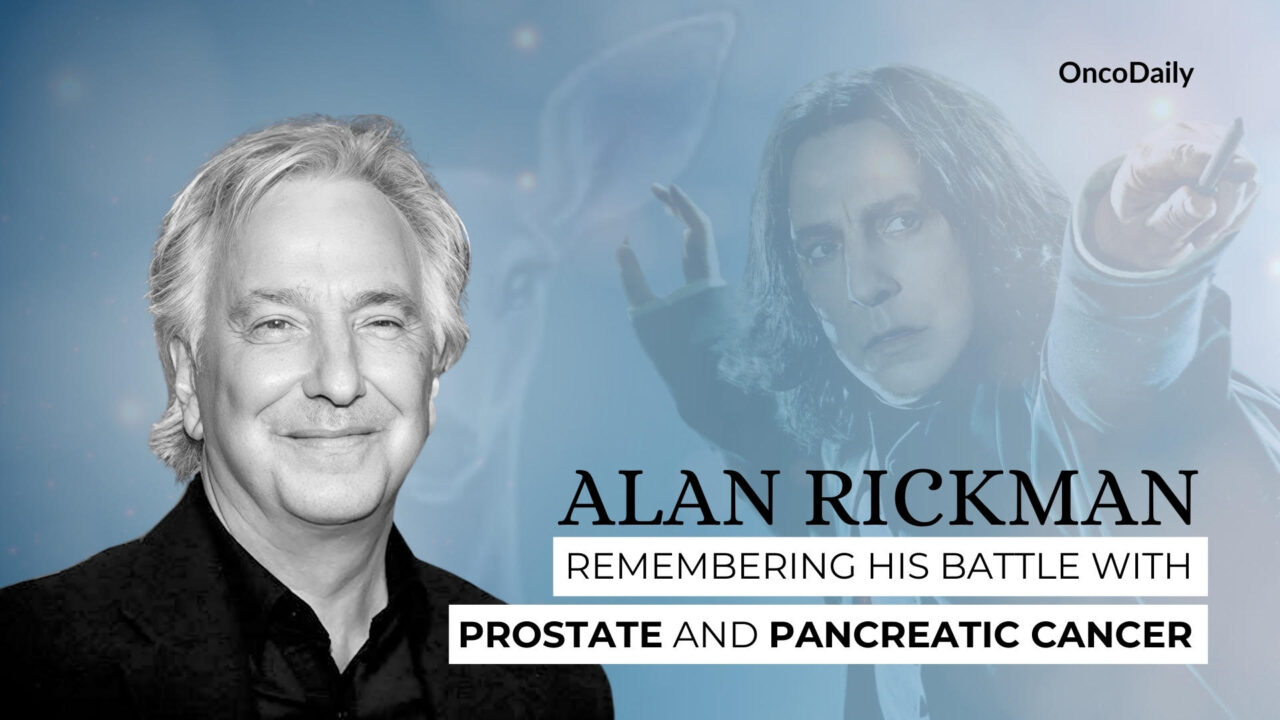
In Memory of Alan Rickman and His Battle with Prostate and Pancreatic Cancer
On February 21, we remember the life and legacy of Alan Rickman, a brilliant actor whose unforgettable performances touched hearts across the globe. From his iconic role as Professor Severus Snape Head of Slytherin House, Defense Against the Dark Arts, The Half-Blood Prince and Order of the Phoenix Member in the Harry Potter series to his wide-ranging work on stage and screen, Rickman’s career was a testament to his depth and range. Off-screen, he faced a courageous battle with prostate cancer, which he was diagnosed with in 2005, and ultimately passed away from pancreatic cancer in 2016.
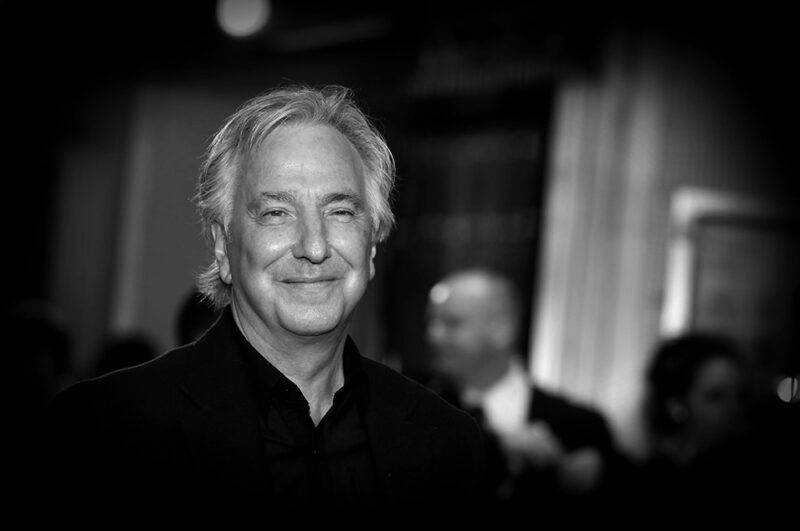
This article honors his enduring impact as both an artist and a human being, reflecting on his remarkable journey and the strength he displayed in the face of illness, as well as offering insight into pancreatic cancer diagnosis, treatment, and prevention.
What Alan Rickman Wrote About His Prostate Cancer in His “Secret Diary”
Alan Rickman’s secret diaries reveal why he chose to continue playing Snape after being diagnosed with prostate cancer. The actor, who starred in Harry Potter from 2001 to 2011, kept journals from 1992, documenting his career and personal life. Early excerpts, published by The Guardian, share his experience with Snape and his cancer diagnosis.
Before filming Harry Potter and the Order of the Phoenix, Rickman was diagnosed with prostate cancer and opted for surgery at Vanderbilt University Medical Center in 2006. In his diaries, he describes the surreal experience of going to the hospital, writing:
“This is like a film set. Nothing seems real. Remembering nothing but with that painkiller high in the recovery room. Attentive, caring people.”
Despite the diagnosis, Rickman decided to continue as Snape, writing, “The argument that wins is the one that says: ‘See it through. It’s your story.'” His health seemed to impact him on set, with Rickman noting how the role of Snape made him more withdrawn and less communicative with the crew. Rickman completed his role as Snape, with his final appearance in Harry Potter and the Deathly Hallows – Part 2.
Alan Rickman and His Final Battle with Pancreatic Cancer
Alan Rickman passed away on January 14, 2016, at the age of 69, after a brief but intense battle with pancreatic cancer. His diagnosis came shortly after he experienced a minor stroke in August 2015, which led to further medical evaluation and the discovery of the disease. Rickman kept his illness largely private, sharing the news only with close friends and family.
The announcement of his death elicited a profound reaction from fans and colleagues alike. Many expressed their shock and sorrow, as Rickman had appeared to be in good health just weeks before his passing. Tributes flooded in from across the entertainment industry, highlighting not only his remarkable talent but also his kindness and generosity as a person. The Pancreatic Cancer Action Network issued a statement mourning his loss and emphasizing the urgent need for increased awareness and research funding for pancreatic cancer, which has one of the lowest survival rates among major cancers.
Rickman’s death came just days after that of David Bowie, another beloved figure who had kept his cancer diagnosis private. This timing further amplified the sense of loss within the community. Many fans reflected on Rickman’s iconic roles, particularly as Severus Snape in the Harry Potter series, and how his performances had touched their lives. His legacy continues to inspire discussions about pancreatic cancer and the importance of early detection and research for better treatment options.

How Alan Rickman Started His Career
Alan Rickman was born on February 21, 1946, in Acton, London, to Margaret Doreen Rose, a housewife of Welsh descent, and Bernard William Rickman, a factory worker of Irish descent. He was the second of four children in a family that faced significant challenges after the death of his father from cancer when Alan was just eight years old. This loss deeply affected the family, with his mother taking on the responsibility of raising her children alone while working for the Post Office.
Rickman showed an early interest in the arts, particularly in painting and calligraphy. He attended Latymer Upper School on a scholarship, where he began participating in school plays. Afterward, he pursued graphic design at Chelsea College of Art and Design and later at the Royal College of Art. Following his studies, he co-founded a graphic design company called Graphiti. However, his passion for acting led him to audition for the Royal Academy of Dramatic Art (RADA), where he was accepted at the age of 26.
Rickman’s early career included roles in various theater productions, where he gained recognition for his talent. His breakthrough came with a role as Reverend Obadiah Slope in the BBC’s The Barchester Chronicles in 1982. This performance set the stage for his future success in both theater and film, ultimately leading to iconic roles that would define his career.
The Roles That Made Alan Rickman a Legend
Alan Rickman’s film career began with his iconic debut as Hans Gruber in the 1988 action classic Die Hard. His portrayal of the sophisticated villain earned him recognition as one of cinema’s most memorable antagonists, redefining the action genre by offering a more nuanced adversary to Bruce Willis’s hero, John McClane.
In 1991, Rickman cemented his status with a BAFTA-winning performance as the Sheriff of Nottingham in Robin Hood: Prince of Thieves, blending menace and dark humor. His versatility continued to shine in Truly, Madly, Deeply (1991), where he played a comforting ghost, and in Sense and Sensibility (1995), as the quiet and strong Colonel Brandon.Rickman’s portrayal of historical figures, such as Eamon de Valera in Michael Collins (1996), showcased his range as an actor. These roles solidified Rickman’s legacy as a versatile actor with powerful performances across genres.
The Harry Potter Years
Alan Rickman’s portrayal of Professor Severus Snape in the Harry Potter series, spanning from 2001 to 2011, is one of the defining roles of his illustrious career. Snape, initially introduced as the stern Potions Master at Hogwarts School of Witchcraft and Wizardry, evolves into a complex character whose true loyalties are revealed over the course of the films. Rickman brought a remarkable depth and nuance to Snape, portraying him as a figure filled with contradictions—hostile yet heroic, bitter yet deeply loving. This complexity made Snape one of the most beloved and iconic characters in the Harry Potter franchise.
“Sectumsempra”
(This curse causes severe lacerations to the target, inflicting painful wounds. Snape created this spell during his time at Hogwarts and it is first introduced in Harry Potter and the Half-Blood Prince when Harry discovers it in Snape’s old Potions textbook).
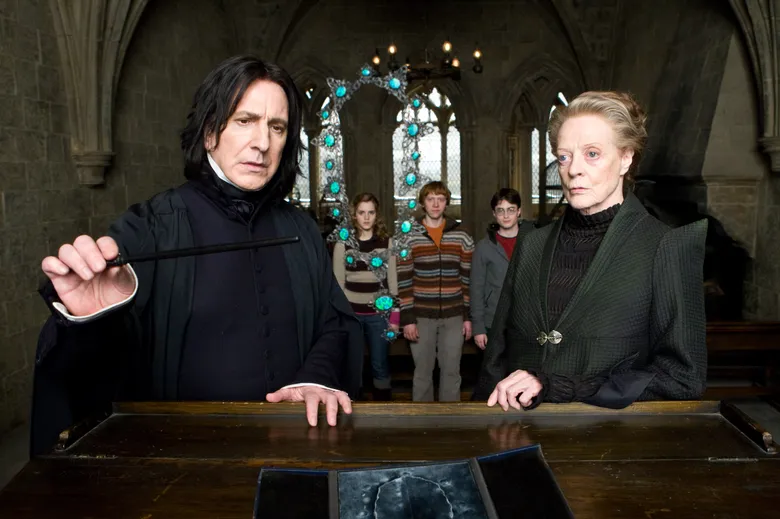
Photo by Warner Bros.
In Harry Potter and the Half-Blood Prince, Professor McGonagall and Snape examine a dark, cursed necklace. This necklace is linked to Voldemort’s past and is one of his Horcruxes. The scene highlights the urgency of finding and destroying Voldemort’s Horcruxes to defeat him.
Rickman’s interpretation of Snape was heavily influenced by insights he received from J.K. Rowling, who shared crucial details about Snape’s backstory and motivations. She revealed that Snape had been in love with Lily Potter, Harry’s mother, which added layers to his character and informed Rickman’s performance. He masterfully conveyed Snape’s internal struggles and conflicting emotions, particularly his resentment towards Harry, who resembled his father James Potter, while possessing his mother’s eyes.
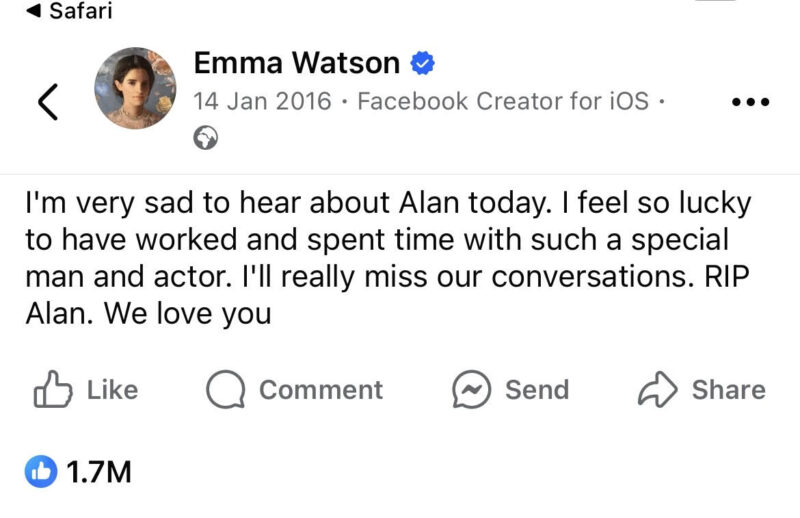
Throughout the series, Rickman’s performance captured the audience’s attention with its emotional depth. His delivery of lines was often imbued with a sense of gravitas that resonated with viewers. Moments such as his iconic “Always” in Harry Potter and the Deathly Hallows became pivotal points in the narrative, solidifying Snape’s status as a tragic hero. Rickman’s portrayal not only garnered critical acclaim but also endeared him to fans worldwide.
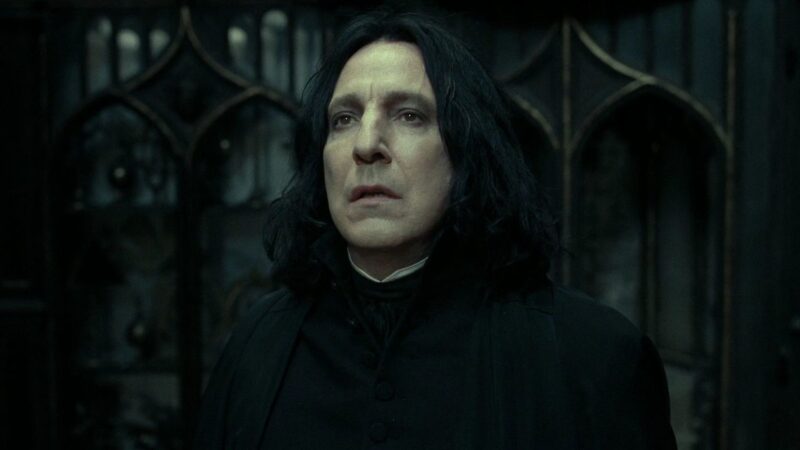
Photo by Worner Bros.
His ability to portray such a multifaceted character helped elevate Harry Potter beyond a simple tale of good versus evil, showcasing the complexities of love, loss, and redemption. As a result, Severus Snape remains one of the most memorable characters in literary and cinematic history, thanks largely to Alan Rickman’s extraordinary talent and dedication to the role.
Love Story of Alan Rickman and Rima Horton
Alan Rickman was in a long-term relationship with Rima Horton, whom he met in 1965 when they were both teenagers. Rima was 18, and Alan was 19 at the time, and they quickly became inseparable. Their love story spanned over five decades, during which they moved in together in 1977 and maintained a largely private life despite Rickman’s fame.
In 2012, after nearly 50 years together, Rickman and Horton married in a secret ceremony in New York City. This revelation came to light in April 2015 when Rickman confirmed their marriage during an interview. He described the wedding as intimate, stating, “It was great because no one was there. After the wedding in New York, we walked across the Brooklyn Bridge and ate lunch.” He humorously mentioned that he bought her a modest ring that she rarely wore.
Rima Horton has had a successful career as an economist and was a Labour Party councillor for the Kensington and Chelsea Borough Council from 1986 until 2006. She also worked as an economics lecturer at Kingston University. Despite their busy careers, Rickman often praised Horton for her support and tolerance, once stating,
“I think every relationship should be allowed to have its own rules. She’s tolerant. She’s incredibly tolerant. Unbelievably tolerant. Possibly a candidate for sainthood.”
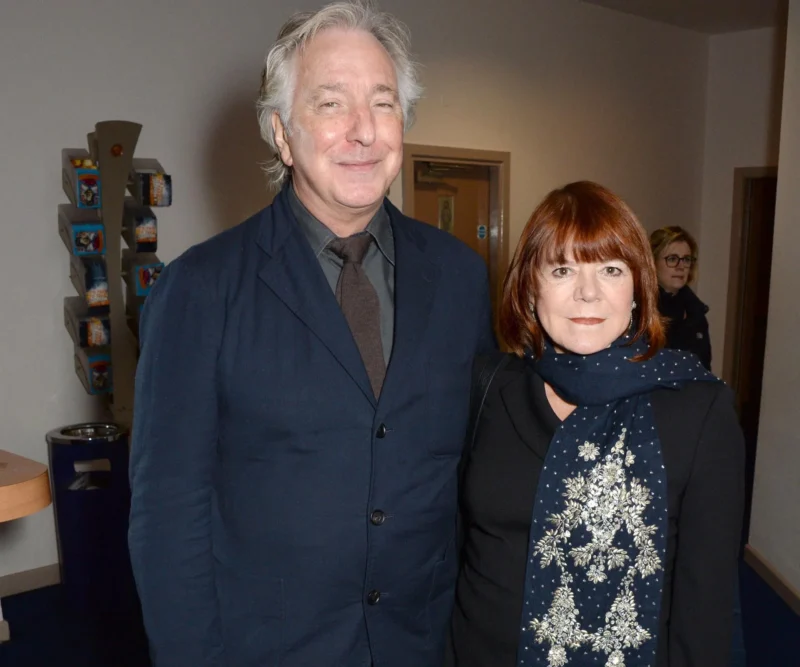
The couple did not have any children, and Rickman expressed mixed feelings about this decision, reflecting on the idea of family but ultimately respecting their shared choice. Following Rickman’s passing on January 14, 2016, Rima received heartfelt condolences from fans and colleagues alike, including a touching message from J.K. Rowling, who recognized the profound loss felt by those who knew him.
Alan Rickman’s Enduring Legacy and Influence
Alan Rickman’s contributions to film and theater are both extensive and impactful, showcasing his remarkable talent, versatility, and unique presence. He began his career on stage, gaining recognition for his performances in classic plays, including his acclaimed portrayal of Le Vicomte de Valmont in the Royal Shakespeare Company’s production of Les Liaisons Dangereuses. This role not only earned him a Tony Award nomination but also marked a turning point in his career, leading to significant film opportunities.
Rickman made a memorable Hollywood debut as Hans Gruber in Die Hard (1988), where his portrayal of the intelligent and cunning villain set a new standard for action movie antagonists. His ability to blend charm with menace captivated audiences and critics alike. He continued to excel in diverse roles, from the Sheriff of Nottingham in Robin Hood: Prince of Thieves (1991), for which he won a BAFTA Award, to the romantic lead in Truly, Madly, Deeply (1991) and the honorable Colonel Brandon in Sense and Sensibility (1995).
Throughout his career, Rickman received numerous awards and accolades for his performances. In addition to his BAFTA win, he was nominated for several prestigious awards, including Golden Globes and Screen Actors Guild Awards. His work in the Harry Potter series as Severus Snape solidified his legacy, with fans and critics praising his nuanced portrayal that revealed the character’s complexity over eight films.
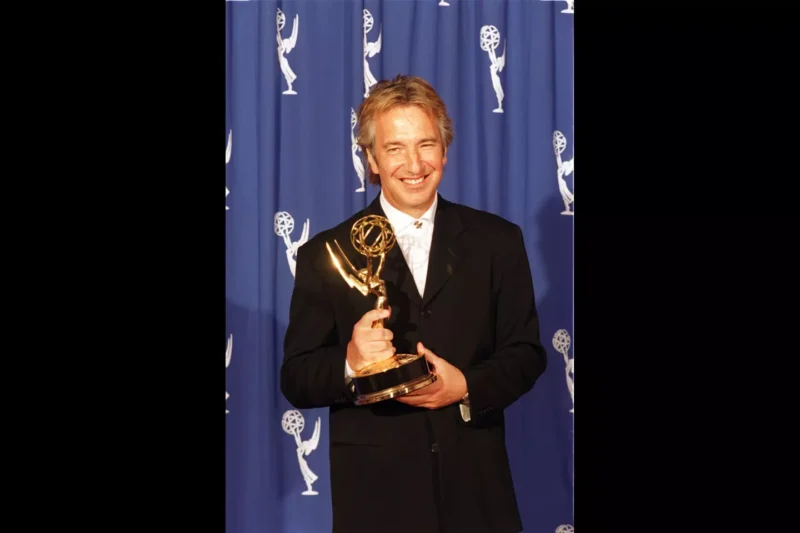
Alan Rickman with his best actor Emmy for his work in “Rasputin.”
Rickman’s lasting impact on the entertainment industry is evident not only in his iconic roles but also in the inspiration he provided to future generations of actors. His distinctive voice, commanding presence, and ability to convey deep emotions made him a beloved figure in film and theater. Many actors cite Rickman as an influence on their own careers, admiring his dedication to craft and the depth he brought to every character he portrayed. His legacy continues to resonate, reminding audiences of the power of storytelling through performance.
Alan Rickman and His Lifelong Dedication to Charity
Alan Rickman was deeply committed to charitable causes throughout his life, reflecting his compassionate nature and desire to make a positive impact. In his will, he left £100,000 to several charities he supported, dividing the amount equally among four organizations: the Royal Academy of Dramatic Art (RADA), which helped aspiring actors; Sponsored Arts for Education, focused on providing educational opportunities in the arts; Saving Faces, dedicated to improving the lives of those affected by facial disfigurement; and the International Performers Aid Trust, aiming to alleviate poverty among performers in challenging conditions.
One of Rickman’s last charitable acts was narrating a video for OneClickGiving to raise funds for refugees. The video, featuring a tortoise eating a strawberry, raised funds for Save the Children and the Refugee Council through YouTube views. It gained millions of views and raised substantial amounts for these causes. Rickman was also involved in human rights initiatives, including the film Closet Land in 1991 to support Amnesty International, reflecting his advocacy for human rights.
Serving as president of the International Performers Aid Trust, Rickman raised awareness for performers living in poverty. His involvement with various charitable organizations and causes highlighted his dedication to helping those in need, particularly in the arts community. Rickman’s philanthropic legacy continues to inspire others, as his contributions went beyond financial donations to active participation in projects that aligned with his values. His example of compassion and generosity continues to resonate with fans and colleagues alike.
What Causes Pancreatic Cancer?
Pancreatic cancer arises when cells in the pancreas undergo genetic mutations, leading to uncontrolled growth and the formation of tumors. While the exact causes remain largely unclear, several risk factors and potential contributors have been identified.
Genetic Factors
Genetic factors and lifestyle choices play significant roles in the development of pancreatic cancer. About 10% of pancreatic cancer cases are linked to inherited mutations in genes such as BRCA1, BRCA2, and those associated with familial syndromes like Lynch syndrome and Peutz-Jeghers syndrome. These mutations increase the likelihood of developing pancreatic cancer, especially in individuals with a family history of the disease. Additionally, many mutations occur after birth due to environmental exposures or random DNA copying errors during cell division. Carcinogens from tobacco smoke and certain chemicals can contribute to these acquired mutations.

Lifestyle factors
Lifestyle factors, such as smoking, obesity, and inactivity, also increase the risk of pancreatic cancer. Smokers are twice as likely to develop pancreatic cancer compared to non-smokers, and the risk remains elevated for years after quitting, although it decreases over time. A high body mass index (BMI) and a sedentary lifestyle are associated with an increased risk, while maintaining a healthy weight and regular physical activity may reduce this risk. Diets high in red and processed meats and low in fruits and vegetables may also contribute to the disease, while a balanced, nutrient-rich diet may lower the risk. Chronic heavy alcohol consumption can lead to chronic pancreatitis, which is linked to an increased risk of pancreatic cancer.
Other risk factors include age, as the likelihood of developing pancreatic cancer increases with age, particularly in individuals over 60. There is also a notable association between type 2 diabetes and pancreatic cancer, with diabetes potentially acting as both a risk factor and a symptom. Chronic pancreatitis, which is long-term inflammation of the pancreas, can lead to genetic damage over time, further increasing the risk of cancer development.
Occupational exposure to carcinogenic chemicals, such as pesticides and dyes, may also elevate the risk. Race and gender can also play a role, as African Americans have a higher incidence of pancreatic cancer, potentially due to higher rates of associated risk factors like diabetes and smoking. Men are generally at greater risk than women. Understanding these factors is essential for identifying individuals at higher risk and promoting preventive measures to help reduce the incidence of pancreatic cancer.
You Can Also Read In Memory of Jimmy Carter and His Battle with Melanoma by OncoDaily
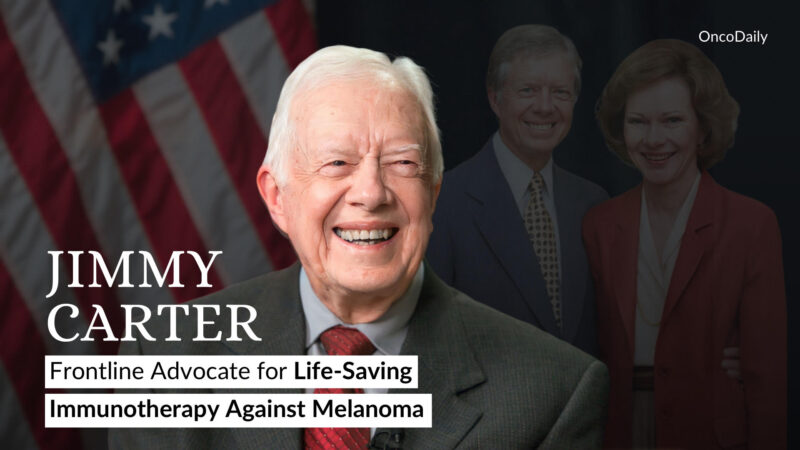
How to Prevent Pancreatic Cancer
Pancreatic cancer has limited prevention strategies, but certain lifestyle changes can significantly reduce the risk. Smoking is the leading risk factor for the disease, and quitting smoking reduces the risk over time, as noted by the American Cancer Society. Maintaining a healthy weight through a balanced diet and regular physical activity is critical, as obesity increases the risk of developing pancreatic cancer (National Cancer Institute). A nutrient-rich diet focusing on fruits, vegetables, whole grains, and lean proteins, while limiting processed and high-fat foods, is another key measure in reducing the risk.
Engaging in regular physical activity, such as aiming for 150 minutes of moderate exercise per week, has been linked to lower cancer risks. Additionally, limiting alcohol consumption, as excessive drinking can lead to chronic pancreatitis— a known risk factor for pancreatic cancer— is crucial. Proper management of diabetes, particularly type 2, through diet and exercise, helps reduce long-term risks associated with the disease.
Avoiding exposure to chemicals like pesticides and dyes in occupational settings, managing chronic pancreatitis, and seeking genetic counseling if there’s a family history of pancreatic cancer can help identify high-risk individuals. Regular check-ups are essential to monitor overall health and detect any precancerous changes early, improving the chances of better outcomes (National Cancer Institute)
How Can Prostate Cancer Be Prevented?
Regular Prostate-Specific Antigen (PSA) tests and screenings are vital for the early detection of prostate cancer, especially for men over 50 or those with a family history of the disease. PSA tests measure the level of PSA in the blood; elevated levels may indicate prostate issues, including cancer. While the normal range of PSA depends on age, a level above the typical range may signal prostate cancer, although noncancerous conditions like prostatitis and benign prostatic hyperplasia (BPH) are more often the cause.
Early-stage prostate cancer often presents minimal symptoms, making regular screenings even more crucial. However, symptoms of early prostate cancer can include difficulty urinating, a slow or interrupted urine flow, frequent urination (especially at night), and incontinence5. More advanced prostate cancer symptoms may include blood in the urine or pain during urination, as well as lower back or pelvic pain.The two most common tests used to detect prostate cancer are the PSA blood test and the digital rectal exam (DRE). During a DRE, a doctor inserts a gloved, lubricated finger into the rectum to feel the prostate gland, assessing its texture and checking for any bumps or hard areas that might indicate cancer.
If either the PSA test or DRE shows abnormalities, further tests are needed to diagnose prostate cancer, typically involving a magnetic resonance imaging (MRI) scan and a transrectal ultrasound (TRUS) biopsy. Early detection through screening is credited with a significant decrease in prostate cancer deaths. However, it’s important to discuss the risks and benefits of PSA testing with a doctor, as the test can sometimes lead to overdiagnosis and unnecessary treatments.
Written by Aharon Tsaturyan, MD
FAQ
When was Alan Rickman diagnosed with cancer?
Rickman was diagnosed with pancreatic cancer in August 2015, shortly after suffering a minor stroke. He kept his diagnosis largely private, only informing close friends and family.
What impact did Alan Rickman's death have on pancreatic cancer awareness?
Following his passing, organizations like the Pancreatic Cancer Action Network emphasized the need for increased awareness and research funding for pancreatic cancer, which has one of the lowest survival rates among major cancers.
Was Alan Rickman married?
Yes, Alan Rickman married his lifelong partner, Rima Horton, in 2012 after being together for nearly 50 years. The couple kept their relationship private and did not have children
What awards did Alan Rickman win during his career?
Rickman won several awards, including a BAFTA Award for Best Supporting Actor for his role as the Sheriff of Nottingham in Robin Hood: Prince of Thieves (1991). He also received an Emmy and a Golden Globe for his performance as Grigori Rasputin in the TV film Rasputin: Dark Servant of Destiny (1996)
What was Alan Rickman's cause of death?
Alan Rickman passed away on January 14, 2016, at the age of 69, due to pancreatic cancer. His illness was kept private until shortly before his death.
What were the symptoms of Alan Rickman's pancreatic cancer?
Pancreatic cancer often presents with vague symptoms that can include abdominal pain, weight loss, and jaundice. In Rickman's case, specific details about his symptoms were not publicly disclosed.
What was Snape's backstory?
Severus Snape was born to a Muggle father and a witch mother, leading to his identity as the "Half-Blood Prince." His difficult childhood experiences, including bullying at Hogwarts, shaped his character and motivations throughout the series.
What is the significance of Snape's Patronus?
Snape's Patronus takes the form of a doe, which symbolizes his enduring love for Lily Potter. This connection is pivotal, as it reflects his deep emotional ties to her and serves as a guiding force for Harry in the final book.
Are all Slytherins evil?
No, while many notable dark wizards have come from Slytherin, not all members embody these traits. Characters like Severus Snape and Andromeda Tonks demonstrate that Slytherins can also be brave and loyal.
Who founded Slytherin House?
Slytherin House was founded by Salazar Slytherin, one of the four founders of Hogwarts School of Witchcraft and Wizardry. He valued pure-blood lineage and was known for his ability to speak Parseltongue
Who is Horace Slughorn?
Slughorn was a Potions Master and Head of Slytherin House at Hogwarts before retiring. He was persuaded to return to Hogwarts by Dumbledore. Slughorn is known for "collecting" promising students into his exclusive "Slug Club"
-
ESMO 2024 Congress
September 13-17, 2024
-
ASCO Annual Meeting
May 30 - June 4, 2024
-
Yvonne Award 2024
May 31, 2024
-
OncoThon 2024, Online
Feb. 15, 2024
-
Global Summit on War & Cancer 2023, Online
Dec. 14-16, 2023

